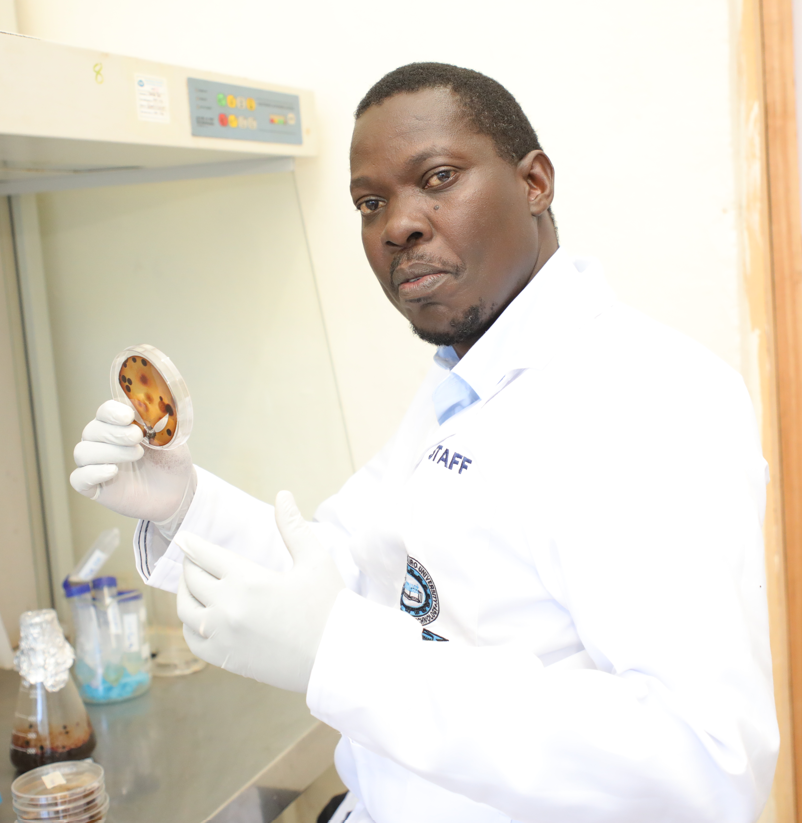 Contact Details
Contact Details
Department of Biological Sciences
School of Natural Sciences (MMUST)
P.O. Box 190-50100
Kakamega, KENYA
Office no. SPD Room 310
Kakamega-Webuye Road
Email: This email address is being protected from spambots. You need JavaScript enabled to view it.
ORCID: https://orcid.org/0000-0003-3985-9421
ResearcherID: ABD-1236-2020
Scopus ID: 56012496500
Google Scholar: G5Aj8Q4AAAAJ
Dr. Dennis M.W. Ochieno
Dr. Dennis M.W. Ochieno is a Senior Lecturer and Researcher in the Department of Biological Sciences. He holds a Doctorate degree in Production Ecology & Resource Conservation, Master of Science in Agricultural Entomology, and Bachelor of Education (Science) in Botany & Zoology. His research and teaching interests are in Multitrophic Interactions between microorganisms, plants, plant-parasitic nematodes, insects and various biotic and abiotic factors, focusing on the phyllosphere, rhizosphere and the endophytic niches, and how these are influenced by various Integrated Pest Management (IPM) technologies.
He is the Director,Short Courses and Webometrics Research.
Some of his key published works include: -
- Janet Tarus , John Muoma , Dennis M.W. Ochieno , Maurice Omolo , Kelvin Kiprotich , Nicholas Kitungulu,Jackson Cheruiyot. Elevation of cytokines and antibodies in guinea pigs experimentally infected with Tunga penetrans.Published on 26th May 2025 in Exploration of Immunology. DOI: https://doi.org/10.37349/ei.2025.1003198
- Kelvin Kiprotich, Esther Muema, Clabe Wekesa, Tavasi Ndombi, John Muoma, Dennis Omayio, Dennis Ochieno, Hamond Motsi, Sipho Mncedi & Janet Tarus. Unveiling the roles, mechanisms and prospects of soil microbial communities in sustainable agriculture. Published on 17th January 2025 in Discover Soil. DOI:https://doi.org/10.1007/s44378-025-00037-4
- Dennis M.W. Ochieno. Fusarium oxysporum and soil nutrient amendments provide short-term inhibition of Cosmopolites sordidus raising questions on biopesticide and plant nutrition potentials in tissue culture banana. Published on 12th Novemebr 2024 in Scientific African. DOI: https://doi.org/10.1016/j.sciaf.2024.e02475
- Dennis M.W. Ochieno, Gloria Nekesa, Victoria Naluyange, Everlyne Otondi, Meshack Obonyo, Jeninah Atwebembeire, Grace Kagoro Rugunda, Insecticides influence colonization and toxin accumulation by Aspergillus and Fusarium in orange and white maize flour varying in susceptibility to mycotoxigenic fungal pathogens.2023,Research Square. DOI: https://doi.org/10.21203/rs.3.rs-2543106/v1
- Nicholas Kipkiror, Edward K. Muge, Dennis M. W. Ochieno & Evans N. Nyaboga.DNA barcoding markers provide insight into species discrimination, genetic diversity and phylogenetic relationships of yam (Dioscorea spp.).Published in Springer on 14 November 2022. DOI: https://doi.org/10.1007/s11756-022-01244-y
- Dennis M.W.Ochieno. Comparative effects of nitrogen, phosphorus and potassium on Radopholus similis infection in East African Highland Banana plants as influenced by rhizosphere biota. Scientific African. Available online 13 August 2022. DOI: https://doi.org/10.1016/j.sciaf.2022.e01320
- Dennis M. W. Ochieno. Soil Microbes Determine Outcomes of Pathogenic Interactions Between Radopholus similis and Fusarium oxysporum V5w2 in Tissue Culture Banana Rhizospheres Starved of Nitrogen, Phosphorus, and Potassium. Front. Sustain. Food Syst., 01 March 2022. DOI: https://doi.org/10.3389/fsufs.2022.706072
- Dennis M. W. Ochieno. Soil Sterilization Eliminates Beneficial Microbes That Provide Natural Pest Suppression Ecosystem Services Against Radopholus similis and Fusarium Oxysporum V5w2 in the Endosphere and Rhizosphere of Tissue Culture Banana Plants. Front. Sustain. Food Syst., 01 March 2022. DOI: https://doi.org/10.3389/fsufs.2022.688194
- Ochieno D.M.W. Fusarium oxysporum V5w2 is a non-beneficial endophyte that interacts with Radopholus similis in a wilt disease complex of banana. Available online 16 (November 2021).https://www.sciencedirect.com/science/article/pii/S246822762100315X. DOI: https://doi.org/10.1016/j.sciaf.2021.e01014.
- Ochieno D.M.W., Karoney E.M., Muge E.K., Nyaboga E.N., Baraza D.L., Shibairo S.I. & Naluyange V. (11 January 2021). Rhizobium-linked nutritional and phytochemical changes under multitrophic functional contexts in Sustainable Food Systems. Frontiers in Sustainable Food Systems. https://doi.org/10.3389/fsufs.2020.604396
- Ochieno D.M.W. (November 2020). Towards consensus on the transfer of Fusarium oxysporum V5w2-enhanced tissue culture banana technology to farmers through public-private partnerships in East Africa. Scientific African. https://doi.org/10.1016/j.sciaf.2020.e00605
- Karoney E.M., Ochieno D.M.W., Baraza D.L., Muge E.K., Nyaboga E.N. & Naluyange V. (2020). Rhizobium improves nutritive suitability and tolerance of Phaseolus vulgaris to Colletotrichum lindemuthianum by boosting organic nitrogen content. Applied Soil Ecology. https://doi.org/10.1016/j.apsoil.2020.103534
- Naluyange V., Ochieno D.M.W., Wandahwa P., Maingi J.M., Ombori O., Mukaminega D., Amoding, A., Odendo M. & Muoma J.V. (2020). Performance of Mwitemania bean under the influence of nitrogen-fixing Rhizobium inoculant, water hyacinth composts and DAP fertilizer in a field infested with Aphis fabae and Colletotrichum lindemuthianum. In Just Enough Nitrogen (pp. 125-138). Springer, Cham. https://doi.org/10.1007/978-3-030-58065-0_9
- Baraza D.L., Neser W., Korir C.J., Juma B.F., Ochieno D.M.W., Kamau R.W., Osogo A.K. & Heydenreich M. (2016). Antimicrobial Coumarins from the Oyster culinary-medicinal mushroom, Pleurotus ostreatus (Agaricomycetes), from Kenya. International Journal of Medicinal Mushrooms 18(10): 905–913. https://doi.org/10.1615/IntJMedMushrooms.v18.i10.60
- Avedi E.K., Ochieno D.M.W., Ajanga S., Wanyama C., Wainwright H., Elzein A. & Beed F. (October 2014). Fusarium oxysporum f. sp. strigae strain Foxy 2 did not achieve biological control of Striga hermonthica parasitizing maize in Western Kenya. Biological Control 77: 7-14. https://doi.org/10.1016/j.biocontrol.2014.05.012
- Naluyange V., Ochieno D.M.W., Maingi J.M., Ombori O., Mukaminega D., Amoding A., Odendo M., Okoth S.A., Shivoga W.A. & Muoma J.V.O. (2014). Compatibility of Rhizobium inoculant and water hyacinth compost formulations in Rosecoco bean and consequences on Aphis fabae and Colletotrichum lindemuthianum Applied Soil Ecology 76: 68-77. https://doi.org/10.1016/j.apsoil.2013.12.011.
- Birch A.N.E., Wheatley R., Anyango B., Arpaia S., Capalbo D., Getu E., Fontes D.E., Kalana P., Lelmen E., Lovei G., Melo I.S., Muyekho F., Ngi-Song A., Ochieno D.M.W., Ogwang J., Pitelli R., Schuler T., Sétamou M., Sithanantham S., Smith J., Van Son N., Songa J., Sujii E., Tan T.Q., Wan F-H. & Hilbeck A. (2004). Biodiversity and non-target impacts: a case study of Bt maize in Kenya. In: Hilbeck. A and Andow D.A. (Eds). Environmental Risk Assessment of Genetically Modified Organisms, Volume 1: A Case Study of Bt Maize in Kenya. CABI, Wallingford, UK, pp. 117–185. https://doi.org/1079/9780851998619.0117.
Research and Innovation Projects

